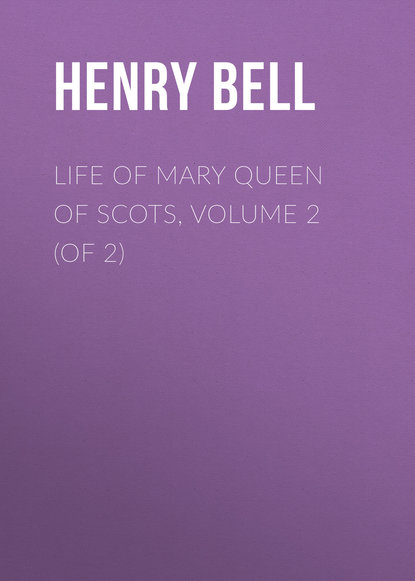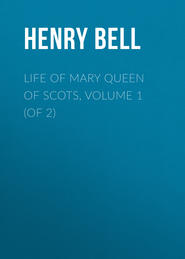По всем вопросам обращайтесь на: info@litportal.ru
(©) 2003-2024.
✖
Life of Mary Queen of Scots, Volume 2 (of 2)
Настройки чтения
Размер шрифта
Высота строк
Поля
137
Throckmorton’s Letter in Keith, p. 444 et seq.
138
What Mark Antony, according to Shakespeare, said of Cæsar, might be, with propriety, applied to the Earl of Murray:
“You all did see that, on the Lupercal,
I thrice presented him a kingly crown,
Which he did thrice refuse. – Was this ambition?”
139
Anderson, vol. ii. p. 251 and 254. – Chalmers, vol. ii. p. 355.
140
Goodall, vol. ii. p. 66. – Anderson, vol. ii. p. 206 et seq.
141
Goodall, vol. ii. p. 299, and Chalmers, vol. i. p. 275 and 278.
142
Jebb, vol. ii. p. 230. – Keith, p. 471 – and Chalmers, vol. i. p. 275.
143
Sir William Drury’s Letter in Keith, p. 470.
144
Buchanan’s Cameleon, p. 13.
145
Jebb, vol. ii. p. 65 and 230. – Keith, p. 471. – Freebairn, p. 152, et seq. – Chalmers, vol. i. p. 277, et seq. The interest taken in Queen Mary by George Douglas, is ascribed by Mackenzie to a motive less pure than the affection of a good subject. His chief characteristic, we are told by that author, was an excessive love of money, and it was by bribing him, he asserts, with the best part of what gold and jewels she had about her, that Mary prevailed upon him to assist her. But this statement does not seem well authenticated. Another story, still more improbable, was told by the Earl of Murray to the English ambassador, Sir William Drury, namely, that Mary had entreated him to allow her to have a husband, and had named George Douglas as the person she would wish to marry. Murray must have fabricated this falsehood, in order to lower the dignity of the Queen; but he surely forgot that the reason assigned in justification of her imprisonment in Loch-Leven, was her alleged determination not to consent to a separation from Bothwell. How then did she happen to wish to marry another? See Sir William Drury’s Letter in Keith, p. 469.
146
Keith, p. 472, et seq.
147
Buchanan, Book xix. – Melville’s Memoirs, p. 200. et seq. – Keith, p. 477. – Calderwood, Crawfurd, and Holinshed. The accounts which historians give of this battle are so confused and contradictory, that it is almost impossible to furnish any very distinct narrative of it, even by collating them all. Robertson hardly attempts any detail, and the few particulars which he does mention, are in several instances erroneous.
148
Keith, p. 481 and 482. – Anderson, vol. iv. p. 1.
149
Anderson, vol. iv. p. 1. et seq. – Keith, p. 481.
150
Goodall, vol. ii. p. 69.
151
Chalmers, vol. i. p. 283.
152
Goodall, vol. ii. p. 71.
153
Anderson, vol. iv. p. 6. – Chalmers, vol. i. p. 288. Even at Carlisle, Mary was always strictly watched. In one of his letters to Cecil, Knollys writes thus: – “Yesterday, her Grace went out at a postern, to walk on the playing green, towards Scotland; and we, with twenty-two halberdeers, diverse gentlemen and other servants, waited upon her. About twenty of her retinue played at foot-ball before her the space of two hours, very strongly, nimbly, and skilfully, – without any foul play offered, the smallness of their ball occasioning their fair play. And before yesterday, since our coming, she went but twice out of the town, once to the like play of foot-ball, in the same place, and once she rode out a hunting the hare, she galloping so fast upon every occasion, and her whole retinue being so well horsed, that we, upon experience thereof, doubting that, upon a set course, some of her friends out of Scotland might invade and assault us upon the sudden, for to rescue and take her from us; we mean hereafter, if any such riding pastimes be required that way, so much to fear the endangering of her person by some sudden invasion of her enemies, that she must hold us excused, in that behalf.”
154
Anderson, vol. iv. p. 95. – Stuart, vol. i. p. 300. It is of Dr Stuart’s translation that we have availed ourselves.
155
Anderson, vol. iv. part ii. p. 33.
156
Buchanan, book xix. It is worth remarking, that of these particular friends of Murray, the two Commissioners, Lord Lindsay and the Commendator of Dunfermlin, and the two lawyers, Macgill and Balnaves, sat on the trial of Bothwell when he was unanimously acquitted. Yet they afterwards accused the Queen of consenting to an unfair trial.
157
Anderson, vol. iv. Part ii. p. 3.
158
Anderson, vol. iv. Part I. p. 12.
159
Goodall, vol. ii. p. 128.
160
Goodall, vol. ii. p. 144.






